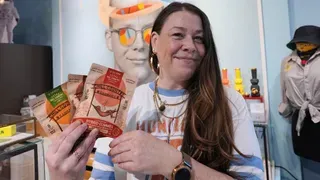March 30, 2013
Teachers are the Anti-Gay Bullies at SoCal High School, Says ACLU
Les Spindle READ TIME: 4 MIN.
Anti-gay bullying is a common problem in schools across the country. But the Southern California chapter of the American Civil Liberties Union, in conjunction with a student Gay-Straight Alliance, has brought to light a related problem that is even more alarming -- this time, it is the teachers that are doing the bullying.
On Mar. 18, with the support of the Nixon Peabody Law Firm, ACLU/SC sent a letter to David McLaughlin, Interim Superintendent for the Hesperia School District in San Bernardino County, alleging that the faculty and administrators of Saltana High School have repeatedly engaged in discriminatory treatment against gay students, along with a demand that the violations cease.
"We brought these matters to the District's attention with the hope [they] would read our letter and frankly be as horrified as we were when we learned what was happening," said Melissa Goodman, a senior staff attorney for ACLU/SC, specializing in LGBT issues. They have called for a response to the allegations by Mar. 25, said Goodman, adding, "We hope they have the desire, like many who work with us, to fix it. We won't be able to make our decision on what to do next until we see how they respond."
As of press time, the school had not released any details about its planned response. But the school district's website posted a public statement from McLaughlin on the same day the letter was sent and received, referring to the allegations as "deeply concerning" and promising "a thorough examination of the situation."
According to Amber Stanford, a junior, who has been a member of Saltana High School's GSA group since its formation two years ago, she and her associates became highly concerned about the ongoing infractions, so they brought the matter to the attention of ACLU/SC.
Among the allegations are refusals by administrators to approve GSA's school events about LGBT issues, censoring words like "gay," lesbian," "bisexual" and "queer" and not allowing the inclusion of GSA's full name in routine loudspeaker announcements and on posters. They also reportedly have failed to list the GSA organization on the roster of official school clubs. In addition, dress code restrictions have allegedly disallowed gender-non-conforming attire worn by students attending the school prom.
In a recent article, Stanford stated that she plans to wear a dress and heels to the prom, but she has close friends who would be affected by the dress code.
"Any student should be able to wear whatever they want no matter if they are boy or girl because it's what they feel comfortable in," said Stanford, who said that her GSA colleagues provided the groundwork for the efforts of Goodman, ACLU/CA and the partnering law firm. "Basically, we gave them examples of harassment that went on at our school. We told our stories and they took them and wrote the demand letter."
Perhaps most outrageously, the alleged infractions in the demand letter extend to verbal harassment of students by some teachers, such as using the term "gay" as an insult in the classroom. The letter includes an example in which a teenage boy commented that he didn't have a date for Valentine's Day, and was told by an instructor it was, "Because you're gay and nobody wants to be with you."
"No LGBTQ student in California should ever have to suffer discrimination or bullying, let alone endure harassing comments and censorship from the very teachers and administrators charged with protecting them," said Goodman. "We know there are many good devoted teachers in schools throughout the state who put a stop to bullying. Sadly, at Saltana High School, it is the adults in charge who are harming the LCBTQ students and allowing a pervasive anti-gay climate to fester. All of Saltana's students deserve better."
Stanford agreed, adding, "These problems are not that widespread among students. They are more widespread among faculty and administrators. The problems definitely need to be fixed. Hopefully the demand letter sent to the administrators will make them see what they have been doing wrong, and they will try to fix it."
Though Goodman's efforts are focused on Southern California, she said that ACLU chapters throughout the country regularly receive various reports of school bullying and harassment. She is not aware of specific cases in which harassment at the hands of administrators and teachers have been dealt with, but she believes that some do occur.
There was evidence in a survey published by Gay, Lesbian & Straight Education Network (GLSEN) in 2012 that some incidents of harassment by teachers have occurred across the nation. The study reported that the most common forms of bias language heard regularly by both students and teachers in elementary school include comments like "that's so gay," "spaz" or "retard," and "fag" or "lesbo."
"In California, we do get reports about school climate problems concerning harassment and bullying, from all over the state, including reports about climates of hate from LGBT students," said Goodman. "In Southern California, there have been more complaints in the Inland Empire [the San Bernardino County area]."
At the same time, she noted that the Saltana High complaints are somewhat unusual even for this area, saying that it was unusual to get complaints that teachers were making derogatory comments and creating a negative climate.
"I think the students have felt that the teachers have made the derogatory comments for some time," said Goodman. "We heard about it four months ago when GSA contacted us to report problems that GSA was having in response to censorship issues, but also as we started speaking with the club, we learned more about derogatory comments teachers had made. I think that the GSA reached out because they really felt like the problems were sort of escalating and that the school abuse was getting worse and worse."
She said that although the ACLU had a reputation for suing people, the GSA was focused on being a resource and working with the school so teachers would comply with the law and make things better.
"We want to make things better and have them comply with the law," said Goodman, "And we work very closely in a very collaborative way with a lot of districts."





